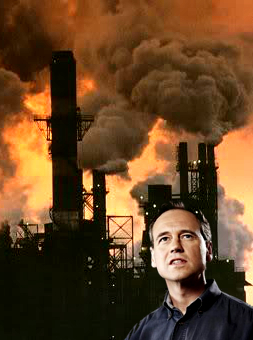Side-stepping and semantics in Hunt's take on power
 Environment Minister Greg Hunt has been grilled over the approval of an enormous NSW coal mine and the nature of emissions trading schemes (ETS) in interviews over the weekend.
Environment Minister Greg Hunt has been grilled over the approval of an enormous NSW coal mine and the nature of emissions trading schemes (ETS) in interviews over the weekend.
Mr Hunt appeared eager to distance himself and the Federal Government from the approval they recently gave to the Shenhua coal mine in New South Wales.
Mr Hunt was interviewed by the ABC’s Barry Cassidy, and asked about an earlier interview with 2GB radio host Alan Jones, in which Mr Hunt appeared to announce an entirely new set of environmental reviews.
“You called for a new review around this mine in the middle of the interview... you said to Alan Jones there'd now be a new review. Now that was news to everybody,” Cassidy said.
“Let me take you through this,” Hut replied after asserting that Mr Cassidy’s calim was “false”.
This isn't a Commonwealth project,” Mr Hunt said.
“This isn't a project over which we have any choice as to whether it comes before us. It was a NSW Labor project. It was then approved by the NSW Coalition. And then it was advanced by Tony Burke when he was a minister.
“We deal with stage 15 of 17. That's it. And it's only against matters of national environmental significance. And what was missing and what was not understood, interestingly until that interview, was that this was always a conditional approval based on not just one or two, but 18 strict conditions, with three critical additional reviews which had to come.
“What we have done, and it would always have been considered by the Independent Expert Scientific Committee, is I have made - made it clear, and this came as no surprise to any of the participants, that I would actually make the final judgment dependent upon the decision and advice of the Independent Expert Scientific Committee.”
Mr Cassidy also asked about Mr Hunt’s claim to Mr Jones that the federal approval was “above and beyond anything that has happened in Australian environmental history”.
“When we announced the conditional approval, these were the strictest conditions in Australian history. The strictest conditions when it was announced,” Mr Hunt said.
“The Commonwealth makes its decisions under the Federal Environment Act on the basis of what are called matters of national environmental significance.
“This is not our project. We have no choice in whether or not the land was allocated, the tenement was allocated, to whom it was allocated. All were Labor Party decisions. All of those were Labor Party decisions. All we do under the act is to determine whether or not the matters of national environmental significance are appropriately managed and the conditions under which they do so.”
Mr Cassidy went on to ask Mr Hunt whether he considered any emissions trading scheme to be a carbon tax, including former Liberal prime minister John Howard's proposed emission trading scheme (ETS).
“In my judgment, absolutely,” Mr Hunt replied.
“No, let me explain this because I do think it's a very important question. Whether you call it a carbon tax or an ETS, it's a tax on emissions.
“The semantic difference is some people try to say a carbon tax is a fixed price and an ETS is a floating price.
“Either way, it's taxing and driving up the price of electricity. It's taxing and driving up the price of gas. It's taxing and driving up the price of fertilisers, of refrigerants, of household goods.
“It's intended to drive up the cost of living and in particular electricity and gas for mums and dads and for pensioners.
“And I would call on Bill Shorten not to rule out the semantics of a carbon tax, because you know he'll deliver it, but to completely ditch the policy, which is about driving up electricity prices.”
By continuing to condemn the relatively conservative idea of an ETS, Mr Hunt has relegated Australia’s climate change action to a place behind countries with more serious measures, including Japan, New Zealand, the United States, South Korea, China, India, Canada and the entire European Union – all of which operate an ETS of some kind.








 Print
Print